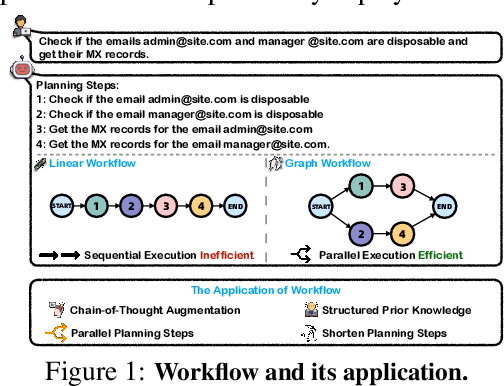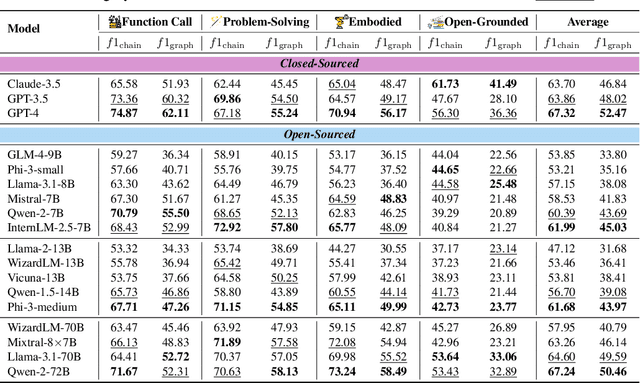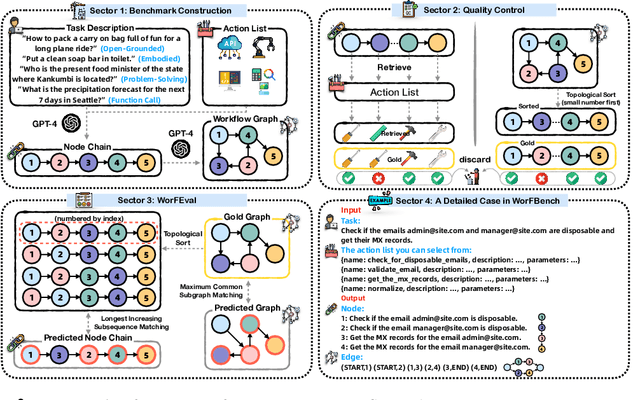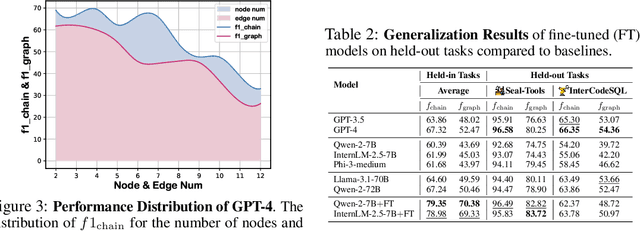Runnan Fang
U-Fold: Dynamic Intent-Aware Context Folding for User-Centric Agents
Jan 26, 2026Abstract:Large language model (LLM)-based agents have been successfully deployed in many tool-augmented settings, but their scalability is fundamentally constrained by context length. Existing context-folding methods mitigate this issue by summarizing past interactions, yet they are typically designed for single-query or single-intent scenarios. In more realistic user-centric dialogues, we identify two major failure modes: (i) they irreversibly discard fine-grained constraints and intermediate facts that are crucial for later decisions, and (ii) their summaries fail to track evolving user intent, leading to omissions and erroneous actions. To address these limitations, we propose U-Fold, a dynamic context-folding framework tailored to user-centric tasks. U-Fold retains the full user--agent dialogue and tool-call history but, at each turn, uses two core components to produce an intent-aware, evolving dialogue summary and a compact, task-relevant tool log. Extensive experiments on $τ$-bench, $τ^2$-bench, VitaBench, and harder context-inflated settings show that U-Fold consistently outperforms ReAct (achieving a 71.4% win rate in long-context settings) and prior folding baselines (with improvements of up to 27.0%), particularly on long, noisy, multi-turn tasks. Our study demonstrates that U-Fold is a promising step toward transferring context-management techniques from single-query benchmarks to realistic user-centric applications.
AutoForge: Automated Environment Synthesis for Agentic Reinforcement Learning
Dec 28, 2025Abstract:Conducting reinforcement learning (RL) in simulated environments offers a cost-effective and highly scalable way to enhance language-based agents. However, previous work has been limited to semi-automated environment synthesis or tasks lacking sufficient difficulty, offering little breadth or depth. In addition, the instability of simulated users integrated into these environments, along with the heterogeneity across simulated environments, poses further challenges for agentic RL. In this work, we propose: (1) a unified pipeline for automated and scalable synthesis of simulated environments associated with high-difficulty but easily verifiable tasks; and (2) an environment level RL algorithm that not only effectively mitigates user instability but also performs advantage estimation at the environment level, thereby improving training efficiency and stability. Comprehensive evaluations on agentic benchmarks, including tau-bench, tau2-Bench, and VitaBench, validate the effectiveness of our proposed method. Further in-depth analyses underscore its out-of-domain generalization.
Towards General Agentic Intelligence via Environment Scaling
Sep 16, 2025Abstract:Advanced agentic intelligence is a prerequisite for deploying Large Language Models in practical, real-world applications. Diverse real-world APIs demand precise, robust function-calling intelligence, which needs agents to develop these capabilities through interaction in varied environments. The breadth of function-calling competence is closely tied to the diversity of environments in which agents are trained. In this work, we scale up environments as a step towards advancing general agentic intelligence. This gives rise to two central challenges: (i) how to scale environments in a principled manner, and (ii) how to effectively train agentic capabilities from experiences derived through interactions with these environments. To address these, we design a scalable framework that automatically constructs heterogeneous environments that are fully simulated, systematically broadening the space of function-calling scenarios. We further adapt a two-phase agent fine-tuning strategy: first endowing agents with fundamental agentic capabilities, then specializing them for domain-specific contexts. Extensive experiments on agentic benchmarks, tau-bench, tau2-Bench, and ACEBench, demonstrate that our trained model, AgentScaler, significantly enhances the function-calling capability of models.
Scaling Agents via Continual Pre-training
Sep 16, 2025Abstract:Large language models (LLMs) have evolved into agentic systems capable of autonomous tool use and multi-step reasoning for complex problem-solving. However, post-training approaches building upon general-purpose foundation models consistently underperform in agentic tasks, particularly in open-source implementations. We identify the root cause: the absence of robust agentic foundation models forces models during post-training to simultaneously learn diverse agentic behaviors while aligning them to expert demonstrations, thereby creating fundamental optimization tensions. To this end, we are the first to propose incorporating Agentic Continual Pre-training (Agentic CPT) into the deep research agents training pipeline to build powerful agentic foundational models. Based on this approach, we develop a deep research agent model named AgentFounder. We evaluate our AgentFounder-30B on 10 benchmarks and achieve state-of-the-art performance while retains strong tool-use ability, notably 39.9% on BrowseComp-en, 43.3% on BrowseComp-zh, and 31.5% Pass@1 on HLE.
Memp: Exploring Agent Procedural Memory
Aug 08, 2025Abstract:Large Language Models (LLMs) based agents excel at diverse tasks, yet they suffer from brittle procedural memory that is manually engineered or entangled in static parameters. In this work, we investigate strategies to endow agents with a learnable, updatable, and lifelong procedural memory. We propose Memp that distills past agent trajectories into both fine-grained, step-by-step instructions and higher-level, script-like abstractions, and explore the impact of different strategies for Build, Retrieval, and Update of procedural memory. Coupled with a dynamic regimen that continuously updates, corrects, and deprecates its contents, this repository evolves in lockstep with new experience. Empirical evaluation on TravelPlanner and ALFWorld shows that as the memory repository is refined, agents achieve steadily higher success rates and greater efficiency on analogous tasks. Moreover, procedural memory built from a stronger model retains its value: migrating the procedural memory to a weaker model yields substantial performance gains.
WebDancer: Towards Autonomous Information Seeking Agency
May 28, 2025Abstract:Addressing intricate real-world problems necessitates in-depth information seeking and multi-step reasoning. Recent progress in agentic systems, exemplified by Deep Research, underscores the potential for autonomous multi-step research. In this work, we present a cohesive paradigm for building end-to-end agentic information seeking agents from a data-centric and training-stage perspective. Our approach consists of four key stages: (1) browsing data construction, (2) trajectories sampling, (3) supervised fine-tuning for effective cold start, and (4) reinforcement learning for enhanced generalisation. We instantiate this framework in a web agent based on the ReAct, WebDancer. Empirical evaluations on the challenging information seeking benchmarks, GAIA and WebWalkerQA, demonstrate the strong performance of WebDancer, achieving considerable results and highlighting the efficacy of our training paradigm. Further analysis of agent training provides valuable insights and actionable, systematic pathways for developing more capable agentic models. The codes and demo will be released in https://github.com/Alibaba-NLP/WebAgent.
SynWorld: Virtual Scenario Synthesis for Agentic Action Knowledge Refinement
Apr 04, 2025Abstract:In the interaction between agents and their environments, agents expand their capabilities by planning and executing actions. However, LLM-based agents face substantial challenges when deployed in novel environments or required to navigate unconventional action spaces. To empower agents to autonomously explore environments, optimize workflows, and enhance their understanding of actions, we propose SynWorld, a framework that allows agents to synthesize possible scenarios with multi-step action invocation within the action space and perform Monte Carlo Tree Search (MCTS) exploration to effectively refine their action knowledge in the current environment. Our experiments demonstrate that SynWorld is an effective and general approach to learning action knowledge in new environments. Code is available at https://github.com/zjunlp/SynWorld.
OmniThink: Expanding Knowledge Boundaries in Machine Writing through Thinking
Jan 16, 2025Abstract:Machine writing with large language models often relies on retrieval-augmented generation. However, these approaches remain confined within the boundaries of the model's predefined scope, limiting the generation of content with rich information. Specifically, vanilla-retrieved information tends to lack depth, utility, and suffers from redundancy, which negatively impacts the quality of generated articles, leading to shallow, repetitive, and unoriginal outputs. To address these issues, we propose OmniThink, a machine writing framework that emulates the human-like process of iterative expansion and reflection. The core idea behind OmniThink is to simulate the cognitive behavior of learners as they progressively deepen their knowledge of the topics. Experimental results demonstrate that OmniThink improves the knowledge density of generated articles without compromising metrics such as coherence and depth. Human evaluations and expert feedback further highlight the potential of OmniThink to address real-world challenges in the generation of long-form articles.
WebWalker: Benchmarking LLMs in Web Traversal
Jan 14, 2025



Abstract:Retrieval-augmented generation (RAG) demonstrates remarkable performance across tasks in open-domain question-answering. However, traditional search engines may retrieve shallow content, limiting the ability of LLMs to handle complex, multi-layered information. To address it, we introduce WebWalkerQA, a benchmark designed to assess the ability of LLMs to perform web traversal. It evaluates the capacity of LLMs to traverse a website's subpages to extract high-quality data systematically. We propose WebWalker, which is a multi-agent framework that mimics human-like web navigation through an explore-critic paradigm. Extensive experimental results show that WebWalkerQA is challenging and demonstrates the effectiveness of RAG combined with WebWalker, through the horizontal and vertical integration in real-world scenarios.
Benchmarking Agentic Workflow Generation
Oct 10, 2024



Abstract:Large Language Models (LLMs), with their exceptional ability to handle a wide range of tasks, have driven significant advancements in tackling reasoning and planning tasks, wherein decomposing complex problems into executable workflows is a crucial step in this process. Existing workflow evaluation frameworks either focus solely on holistic performance or suffer from limitations such as restricted scenario coverage, simplistic workflow structures, and lax evaluation standards. To this end, we introduce WorFBench, a unified workflow generation benchmark with multi-faceted scenarios and intricate graph workflow structures. Additionally, we present WorFEval, a systemic evaluation protocol utilizing subsequence and subgraph matching algorithms to accurately quantify the LLM agent's workflow generation capabilities. Through comprehensive evaluations across different types of LLMs, we discover distinct gaps between the sequence planning capabilities and graph planning capabilities of LLM agents, with even GPT-4 exhibiting a gap of around 15%. We also train two open-source models and evaluate their generalization abilities on held-out tasks. Furthermore, we observe that the generated workflows can enhance downstream tasks, enabling them to achieve superior performance with less time during inference. Code and dataset will be available at https://github.com/zjunlp/WorFBench.
 Add to Chrome
Add to Chrome Add to Firefox
Add to Firefox Add to Edge
Add to Edge